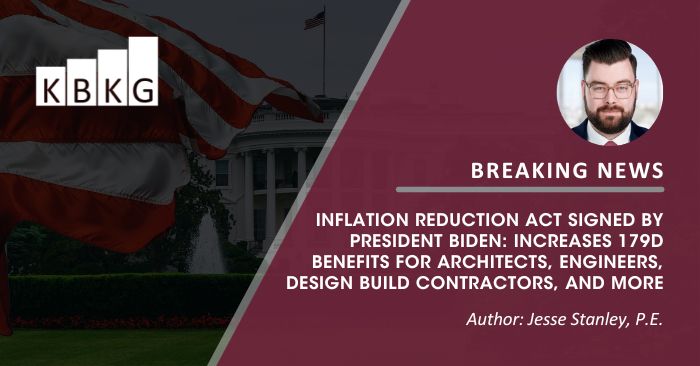President Biden signed the Inflation Reduction Act into law, minting a historic climate bill with aims to reduce carbon emissions by 40% by 2030 among many major economic initiatives. Within the 700+ page bill, the Inflation Reduction Act includes significant tax incentive opportunities which expand 179D Deductions for Architects, Engineers, Design Build Contractors, and other designers of tax-exempt buildings (government and non-profit).
What is 179D?
The 179D Energy Efficient Commercial Buildings Tax Deduction, made permanent in 2020, is a significant financial incentive geared towards:
- Architects, Engineers, and other Designers of government-owned buildings
- Building owners (commercial or multifamily)
- Tenants making improvements
To qualify, new construction and renovated buildings must meet or exceed certain energy reduction requirements. For tax year 2022, the 179D Energy Efficient Commercial Building Tax Deduction is available for up to $1.88/sf for Architects, Engineers, and Design-Build Contractors of tax-exempt buildings as well as commercial buildings owners.
How Does the Inflation Reduction Act Make 179D More Valuable?
The Inflation Reduction Act expands both the impact and scope of the 179D tax deduction. Beginning January 1, 2023, the maximum allowable benefit increases from $1.88/sf to $5.00/sf of building area.
Example: 250,000 sf middle school project that would have previously qualified for up to $470,000 in 2022 or prior tax years, will now be eligible for up to $1,250,000 in 2023!
In 2022 and prior years Architects, Engineers, and Design-Build contractors are eligible to receive allocations on projects they designed for federal, state, and local government-owned buildings. Starting in 2023 they can now ALSO receive allocations for their design work on the tax-exempt entities listed below. This means many building types that were previously ineligible to participate in 179D now can!
Now eligible tax-exempt entities include:
- charitable organizations,
- churches & religious organizations,
- private schools & universities,
- private foundations,
- political organizations,
- other non-profits,
- Native American tribal governments, and
- Alaska Native Corporations
Do you have questions about the Inflation Reduction Act? If you are an architect, engineer, or designer of government-owned or tax-exempt buildings, then these changes are of great benefit to you. Contact us today for a no-obligation assessment with our experts.
More information about: How the Inflation Reduction Act of 2022 Expands Energy Efficiency Tax Incentives for the Real Estate Industry
About the Author
 Jesse Stanley, P.E – Director & Practice Leader
Jesse Stanley, P.E – Director & Practice Leader
Pasadena
Jesse Stanley, P.E. is a Director and Practice Leader of KBKG’s 179D Tax Deduction Group. Prior to KBKG, he spent nearly a decade leading a team of 100+ Professionals identifying tax savings for Building Owners and Designers. He helped Architects, Engineers, and Design Build Contractors, claim the 179D Energy Efficient Commercial Building Tax Deductions for their new and existing building projects across over 2 billion square feet of commercial building space. » Full Bio


